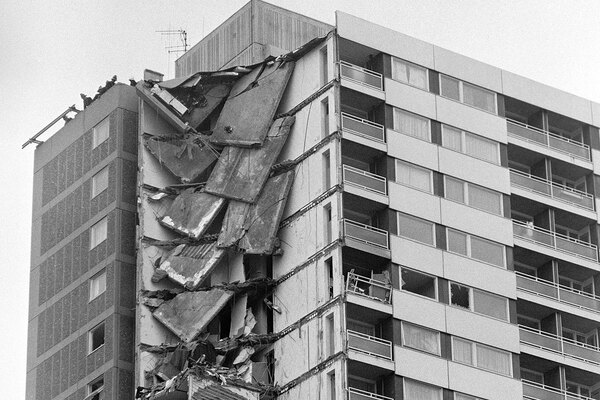Promising progress
Inside Housing’s award-nominated Empty Promise campaign launched a year ago this week. There’s been plenty to celebrate since, says David Ireland, chief executive of the Empty Homes Agency

A joy of working to bring empty homes back into use is that almost everybody agrees in principle.
Nobody thinks that it’s a good idea to let homes sit empty when people need them. The snag is that almost nobody agrees about how to solve the problem.
Incentives for empty homeowners are wasteful rewards for bad behaviour. Powers for councils to intervene are Stalinist state control. Yet here is a problem becoming more acute. In England there are more than three-quarters of a million empty homes; across the UK it’s nearly a million. After years of progress on empty homes the housing market downturn has wreaked havoc causing new apartments to sit unoccupied, housing regeneration schemes to stall and rented properties to fall out of the market. People in desperate housing need see properties lying unused and quite rightly demand: why can’t I live there?
Launched a year ago this week, Inside Housing’s Empty Promise campaign didn’t attempt to find all the answers; but it tried at least to propose action that could be taken. Its three demands aimed to help councils, housing associations and property owners make a real difference. Two of the demands had been achieved by the time the campaign wrapped up in April, with the third looking promising. So, a year on from the start, what has changed?
First, the government had long talked about the key role councils should play in getting empty homes into use. In 2006 it introduced new powers for them: empty dwelling management orders empowered authorities to assume management of empty homes, fix them up and let them. Initially well-received by councils, EDMO implementation was less than overwhelming. By 2009 just 19 orders had been made. Councils complained of lack of guidance about how to use them. The obvious answer was to produce a ‘how to’ guide based on the experience of those which had issued EDMOs. The Empty Homes Agency had previously called for the government to do this. The campaign made the demand again. The result? Success! The agency produced the guide, and housing minister Margaret Beckett endorsed it and implored councils to use it. (Unfortunately there are no recent figures to discover how much they have done so.)
The second demand focused on housing associations, which have a track record of turning abandoned properties into social homes. But over the years this role declined in favour of building new homes; not least because that’s where the subsidy is.
Empty Promise demanded that the Homes and Communities Agency offer housing associations grant to reuse empty homes. The result? Partial success. The HCA has recently reinvigorated its temporary social housing grant programme; and in a BBC interview with me, agency chief Sir Bob Kerslake pledged to treat new build and empty home grant applications equally. The Conservatives went further and launched an ‘empty property rescue’ plan to encourage more housing association action on empty homes.
Lastly, the campaign demanded help for the owners of empty properties. Why, it asked, is VAT zero-rated on building a new home but charged fully on creating one from an empty home? The campaign demanded reform. Did we get it? No, but there’s been much progress. Decisions on VAT are now back with the UK government. At least we can no longer blame Brussels. The Liberal Democrats have adopted reforming VAT on empty homes as a policy and indeed, just this month, it pledged to invest £1.4 billion in getting a quarter of a million homes back into use.
Despite the recession, all the evidence shows that renovating empty properties is easier, cheaper and less environmentally damaging than building new homes. With new build rates running well below target the incentive to get empty homes back into use has perhaps never been greater.
In the year since the Empty Promise campaign was launched progress has been impressive. There is real evidence that councils are doing more. The lack of consensus over what should be done which a year ago looked like a snag, has proved a boon as a flood of new ideas and policies has emerged. Take a bow, Empty Promise. You certainly played your part.
A year of change: political support for tackling empty homes since Empty Promise launched
Jan 2009
Empty Promise Campaign launches
Feb 2009
Conservatives launch their empty property rescue plan which includes a promise of greater flexibility for HCA funding to allow housing associations to buy empty homes
Feb 2009
Liberal Democrats demand equal VAT rates for building new homes and renovating empty ones, and rate relief for owners of commercial property to use premises as temporary housing
March 2009
Housing minister Margaret Beckett announces increased support for councils tackling empty homes
June 2009
Conservative green paper suggests all government bodies and agencies publish details of empty properties they own; also moots extending powers allowing the public to request the disposal of empty property owned by public bodies
July 2009
Green Party MEP Caroline Lucas champions the envionmental credentials of reusing empty homes
September 2009
Liberal Democrat housing spokesperson Sarah Teather advocates allowing low income families to self-renovate homes where regeneration schemes have stalled
January 2010
Liberal Democrats commit to spend £1.4 billion to bring 250,000 empty homes back into use if they win power
The difference a year makes
Number of homes brought back into use by local authorities
2008 31,365
2009 36,059
National empty homes policy commitments made by political parties
2008 0
2009 13
Empty homes reported by the public to councils through the Empty Homes Agency
2008 239
2009 1218
Annual check-up
Empty Promise attracted almost 380 backers. Here three of them sum up its achievements a year on.
‘Inside Housing’s campaign has helped raise the profile of this important issue. We’re proposing new standards for social housing landlords, coming into force from 1 April. One of these standards, the tenancy standard, proposes that landlords must minimise the time that properties are empty between each letting.’
Peter Marsh, chief executive, Tenant Services Authority
‘Lib Dem manifesto proposals for a £1.4 billion fund would bring a quarter of a million homes back into use for the families that desperately need them. I congratulate Inside Housing on running this campaign and urge Labour and the Conservatives to put their money where their mouth is.’
Sarah Teather, Liberal Democrat housing spokesperson
‘This is a permanent problem but people bust a gut trying to build new homes. The campaign raised awareness internally and it is vital for the media to keep talking about the problem.’
Bill Payne, chief executive, Metropolitan Housing Partnership
Additional reporting by Nick Foulis








